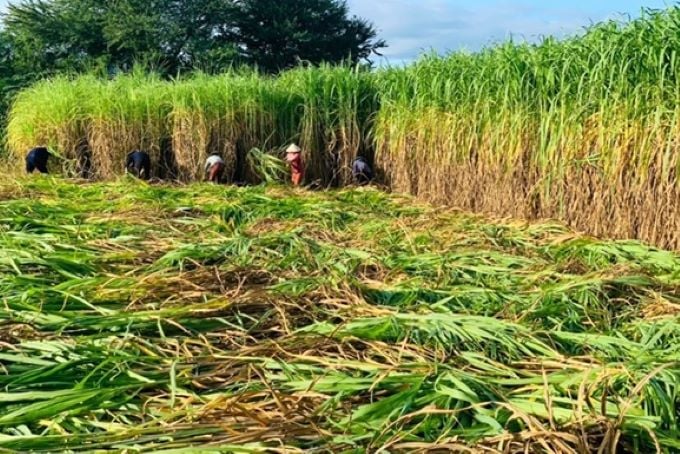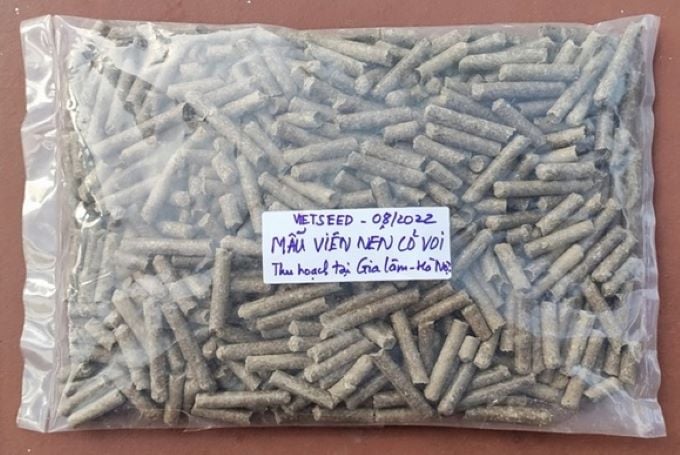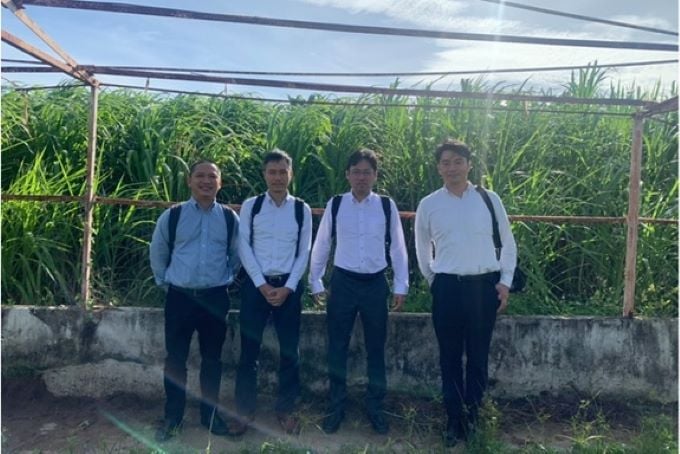November 23, 2025 | 00:26 GMT +7
November 23, 2025 | 00:26 GMT +7
Hotline: 0913.378.918
November 23, 2025 | 00:26 GMT +7
Hotline: 0913.378.918
Wood pellet as heating combustion has been playing the role of a “billion-USD” export product, but its material supply source is becoming more and more scarce. Woody plants are known to have a slow growth rate, requiring at least 5-7 years for one harvest. Mass exploitation and overuse of woody plant biomass for energy remain a hot debate among world scientists as it results in the destruction of long-term carbon storage, severely affecting the living environment of organisms and biodiversity.
On the other hand, elephant grass (Napier) can offer several harvests per year. This plant serves as a great source of green and safe material, ensuring uniform, stable and renewable material for pellet production. However, this type of herbaceous crop biomass pellet usually has a lower heating value and higher ash content compared with other types of wood pellets.

Vietseed harvested and calculated the yield of the grass group as a trial phase in December 2022.
Many energy experts argue that the utilization of this energy biomass might become an inevitable trend to replace fossil fuels such as coal, but it requires appropriate combustion methods as well as the government’s support in its initial stages.
Having high hope for future possibilities and already possessing a great background in grass and forage research, Viet Seed Co., Ltd (Vietseed) has organized a research group to focus on all aspects of elephant grass cultivation to produce pellets for more than two years.
The results of the trial planting of the latest group of elephant grass varieties that Vietseed carried out in Ninh Thuan show that elephant grass VS-19’s dry matter reached 21.3 tons/ha/cutting, 12.2% higher than the control local elephant grass. VS-19 has the potential to reach dry matter production of up to 42.5 - 63.8 tons/ha/year.
Data on the quality of elephant grass VS-19’s biomass energy from the Analysis and Testing Center 2 (Vinacontrol) is as follows: Net calorific value 4113 Kcal/kh; Gross calorific value 4404 Kcal/kg; Ash (6.0%); S (0.08%), N (0.38%), Cl (0.42%), K (1.22%), Na (0.01%), Ca (0.27%), SiO2 (2.63%) and total Carbon (47.97%).
In the other trial plantation of VS-19 conducted in Gia Lam (Hanoi, Vietnam), this variety gains a dry matter production of 55.9 ton/ha/year under fertile soil conditions. According to the analysis of Intertek Vietnam, the quality of the fuel pellet samples is as follows: Diameter (8mm); moisture content (6.71%); Net calorific value (3830 Kcal/kg); Volatile matter (70.7%); Fixed Carbon (16.8%); Ash (5.88%); Bulk density (692 kg/m3); S (0.04%); N (0.69%); Cl (0.09%); K + Na (1.676 mg/kg); Fine dust (1.38%); Trace elements such as Hg, As, Cd, Cr, Cu, Ni, Pb, Zn are <0.05; <1.0; <0.1; 2.86; 7.53; 1.80; 7.32; 28.53 mg/kg respectively.

VS-19 pellet sample in Vietseed's pilot field at Gia Lam, Hanoi.
Concerning the purpose of CO2 neutral requirement (Net-zero Carbon), Vietseed’s research group has come to some initial assessment: Having the photosynthetic properties of the C4 cycle, elephant grass (Pennisetum purpureum) can produce a new volume of dry matter-associated biomass 3-4 times higher than that of woody plants, reaching 42.5 - 63.8 tons/ha/year, equivalent to a carbon accumulation capacity (at the rate of 47.97% dry matter) of 20.4 - 30.6 tons/ha/year. Converting according to the C-CO2 coefficient (3.67 times) shows that the CO2 absorption capacity reaches 74.8 - 112.3 tons/ha/year. Meanwhile, factors causing greenhouse gas emissions such as tillage, fertilizer, mechanization, pesticides, are much lower compared to other yearly and seasonal crops.

Japan Kobelco group representative officers inspect Vietseed's elephant grass trial production for energy biomass purposes in Ninh Thuan, Vietnam.
According to Dr. Tran Dang Xuan, a member of the research team, Japan is making strong efforts to switch to using renewable energy sources. Results show that the quality of elephant grass as a heating material is equal to sorghum and other herbaceous biomass crops that the Japanese side is focusing on developing.
Elephant grass is easy to grow and highly adaptable to Vietnam’s humid tropical ecology conditions. This plant shows almost no competition for fertile agricultural soil with other staple grain and food crops, has resistance to pests and disease while possessing extremely high CO2 absorption capacity. Elephant grass is thus a very potential energy crop in the near future. Elephant grass biomass may possibly be a “super clean” material for producing organic fertilizer serving premium markets such as Japan.
“In addition to actively participating in the research, we will promote to publish the team’s achievement in Japan soon and invite this country’s investors to help further expand and develop the project,” said Dr. Tran Dang Xuan.
Experts with many years of experience in grass production confirm the possibility to implement mass elephant grass cultivation for biomass in the condition that the final income can meet the demand of growers, not to mention the quality of elephant pellet feed can be adjusted through the crop’s age. The use of pellet feed is also very easy after moistening, whether it is for direct feeding or silage.
Translated by Samuel Pham

(VAN) The information was shared at the seminar 'Urban Agriculture - Solutions for Developing Green Spaces,' organized by the Kinh te & Do thi Newspaper and the Biotechnology Center of Ho Chi Minh City.
/2025/11/19/4141-2-132831_216.jpg)
(VAN) One of Japfa's outstanding solutions is implementing digital transformation and artificial intelligence (AI) to optimize operations, enhance productivity, and advance sustainable development.
/2025/11/19/4847-1-093540_448.jpg)
(VAN) The Gia Lai Provincial People’s Committee had a working session with the delegation of the U.S. Department of Agriculture, the State of Idaho, and representatives of the State's leading enterprises.

(VAN) Ca Mau has a sufficient foundation to become a strong regional aquaculture center, where production integrates the economy, the environment, and the lives of the people.

(VAN) SEIKI Group envisions itself as a pioneer in the ‘dual transformation’ of digital technology and green industry, standing alongside the Government and Vietnamese businesses in their pursuit of sustainable development.

(VAN) The VNGEONET network affirms Viet Nam's progress in mastering digital space, providing a precise positioning data platform to serve socioeconomic development.
/2025/11/14/3247-1-184556_35.jpg)
(VAN) Thai Nguyen is methodically implementing digital transformation in the livestock sector, laying the foundation for a modern, transparent, and sustainable agriculture.